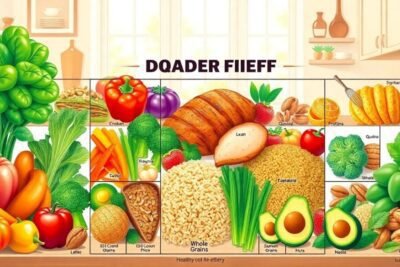
How to lower blood pressure fast for test
Managing blood pressure is crucial, especially before a medical test. Knowing how to lower blood pressure fast for test can help you get the best results possible. In this article, we'll explore effective strategies that can make a difference.
- What are effective lifestyle changes to lower blood pressure?
- How can I lower my blood pressure quickly before a test?
- What foods can help lower blood pressure instantly?
- What are some relaxation techniques to reduce blood pressure?
- How does exercise impact blood pressure control?
- What are the best practices for measuring blood pressure before a test?
- How to prepare for a DOT physical exam to maintain low blood pressure?
- Related questions about managing blood pressure effectively
What are effective lifestyle changes to lower blood pressure?
Making lifestyle modifications can significantly impact high blood pressure management. One of the first steps is to focus on losing excess weight, particularly around the waist, as this can have a direct correlation with blood pressure levels.
Engaging in regular aerobic and strength exercises is equally important. Aim for at least 150 minutes of moderate-intensity aerobic activity each week, such as brisk walking or cycling. Additionally, incorporating muscle-strengthening activities twice a week can further enhance cardiovascular health.
- Reduce sodium intake to help control blood pressure.
- Limit alcohol consumption, as excess can raise blood pressure.
- Quit smoking; the chemicals in tobacco can damage blood vessels.
- Ensure sufficient sleep, as lack of rest can elevate blood pressure.
Finally, managing stress through techniques like meditation and relaxation can also play a significant role in lowering blood pressure. These lifestyle changes not only help in controlling blood pressure but can also improve overall heart health.
How can I lower my blood pressure quickly before a test?
If you're looking for immediate ways to lower your blood pressure before a test, consider incorporating relaxation techniques. Deep breathing exercises can quickly calm your body and mind. Try inhaling deeply for five seconds, holding your breath for a moment, and exhaling slowly.
Avoid smoking and caffeine before the test, as these substances can elevate blood pressure. Instead, focus on staying hydrated and resting. Proper hydration helps optimize your body's functions, including heart health.
Additionally, make sure to measure your blood pressure correctly. Use an appropriate cuff size, as an incorrect size can lead to inaccurate readings. Rest for at least five minutes before taking the measurement to ensure the results reflect your true blood pressure.
What foods can help lower blood pressure instantly?
Incorporating certain foods into your diet can have a rapid effect on blood pressure. Foods rich in potassium, such as bananas, oranges, and spinach, can help balance sodium levels in your body.
Other beneficial foods include:
- Beet juice, which contains nitrates that can help dilate blood vessels.
- Fatty fish like salmon, which is high in omega-3 fatty acids that improve heart health.
- Berries, particularly blueberries, which contain antioxidants that promote healthy blood vessels.
- Dark chocolate, consumed in moderation, may also lower blood pressure due to its flavonoid content.
These dietary adjustments not only help in the short term but also contribute to long-term blood pressure management. When planning meals, focus on a blood pressure diet rich in fruits, vegetables, whole grains, and low-fat dairy.
What are some relaxation techniques to reduce blood pressure?
Incorporating relaxation techniques into your daily routine can effectively lower blood pressure. One popular method is mindfulness meditation, which encourages you to focus on the present moment and manage stress.
Another effective technique is progressive muscle relaxation. This involves tensing and then relaxing different muscle groups to relieve tension throughout the body.
- Yoga can enhance flexibility and promote relaxation.
- Deep breathing exercises help reduce stress and promote calmness.
- Listening to soothing music can also lower stress levels and consequently blood pressure.
Each of these techniques can provide immediate relief and contribute to long-term health improvements.
How does exercise impact blood pressure control?
Regular exercise plays a critical role in managing high blood pressure. It strengthens the heart, allowing it to pump blood more efficiently, which can lead to lower blood pressure readings.
Both aerobic exercises, like walking and cycling, and resistance training are effective. Aim for at least 30 minutes of moderate exercise most days of the week. This not only helps lower blood pressure but also helps maintain a healthy weight.
Moreover, incorporating physical activity into your daily routine can improve your overall cardiovascular health. Simple changes, like taking the stairs instead of the elevator or walking during lunch breaks, can substantially impact your blood pressure over time.
What are the best practices for measuring blood pressure before a test?
To obtain accurate blood pressure readings, follow these best practices. First, ensure you're using a properly calibrated blood pressure monitor. The cuff size should fit snugly around your upper arm; an incorrect size can lead to false readings.
Before measuring, sit quietly for at least five minutes and remove any tight clothing from your arm. Make sure your feet are flat on the floor and your back is supported during the measurement.
- Take multiple readings and average them for the most accurate result.
- Check your blood pressure at the same time each day to monitor changes.
- Record your readings to discuss with your healthcare provider.
By adhering to these guidelines, you can strive for accurate readings that reflect your true blood pressure levels.
How to prepare for a DOT physical exam to maintain low blood pressure?
Preparing for a DOT physical exam requires careful planning, especially for those managing hypertension. Start by focusing on dietary choices that support low blood pressure. Increase your intake of potassium-rich foods while avoiding salty and fatty foods.
Additionally, practicing deep breathing exercises can help calm your nerves before the exam. Staying relaxed during the test is key to achieving accurate blood pressure readings.
Drinking beet juice is also a helpful tip, as it can temporarily lower blood pressure. Ensure that you avoid caffeine and nicotine on the day of the exam, as both can elevate blood pressure.
How can I lower my blood pressure quickly before a test?
To lower blood pressure quickly before a test, utilize relaxation techniques such as deep breathing or meditation. Avoid caffeine and nicotine, both of which can spike blood pressure levels. Staying hydrated and ensuring a calm environment will also help.
How can I lower my blood pressure urgently?
If you need to lower your blood pressure urgently, consider drinking water and engaging in deep breathing exercises. Avoiding stressors and relaxing before the test can help create a conducive environment for better readings.
How do I get my BP down ASAP?
To lower your blood pressure as quickly as possible, focus on relaxation methods like meditation and controlled breathing. Staying seated and maintaining a calm demeanor can also help in achieving a lower reading.
How to lower your blood pressure for a blood test?
To prepare for a blood test, follow a low-sodium diet a few days prior, stay hydrated, and engage in light physical activity. Make sure to relax before the test and avoid stimulants like caffeine.










